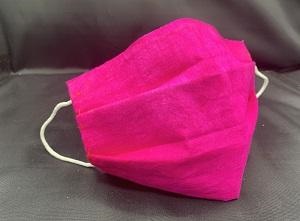- A new type of cloth face mask that can be disinfected by the sun has been created by researchers from AMS.
- The mask is close to 100% effective at killing bacteria and viruses.
- It can also be hand washed several times without losing its antimicrobial activity.
It's been proven in several studies that face masks help to limit the spread of the new coronavirus as the virus is mainly transmitted through respiratory droplets (when people cough, sneeze, or talk) and personal contact.
Although masks protect the people wearing them by reducing the number of droplets from others reaching their respiratory tract, evidence suggests that different types of masks yield different results.
More than this, live bacteria and viruses can easily stick to the surfaces of masks, and be transferred elsewhere as soon as the wearer touches or removes it.
Taking this into consideration, researchers from the American Chemical Society developed a special kind of cotton face mask that kills up to 99.9999% of bacteria and viruses within 60 minutes of daylight exposure.
Their findings were recently published in the journal ACS Applied Materials & Interfaces.
The process of creating the mask
Peixin Tang, Gang Sun, Nitin Nitin, and colleagues aimed to develop a new cotton fabric that would release reactive oxygen species (ROS) when exposed to daylight, killing microbes attached to the fabric's surface.
They also wanted the fabric to be washable, reusable, and safe to wear.
This invention would also be convenient as wearers could disinfect the mask during their lunch hour outside in the sun. The same effect could also be achieved by spending longer periods of time under office or building lights, which are much less intense than sunlight.
“Cotton fabrics with durable and reusable daylight-induced antibacterial/antiviral functions were developed by using a novel fabrication process," the researchers wrote.
The process, they explained, involved attaching positively charged chains of 2-diethylaminoethyl chloride (DEAE-Cl) to ordinary cotton.
Following this, they dyed the modified cotton in a solution of a negatively charged photosensitiser (a compound that releases ROS upon exposure to light), which attached to the DEAE chains by strong electrostatic interactions.
A fabric made with a dye called rose Bengal as the photosensitiser was found to kill 99.9999% of bacteria added to the fabric within 60 minutes of daylight exposure, and inactivated 99.9999% of T7 bacteriophage (a virus thought to be more resistant to ROS than some coronaviruses) within 30 minutes.
Can be hand washed several times
Even greater news is that, based on additional testing, the material can be hand washed at least 10 times and constantly exposed to daylight for at least seven days without losing its antimicrobial activity.
"This work demonstrated that... the resulting fibre materials could inspire the development of reusable and sustainable PPE with significant bioprotective properties to fight the Covid-19 pandemic as well as the spread of other contagious diseases," the researchers said.
READ | Here are the best and worst materials for face masks
READ | A simple experiment can determine which fabric face masks are most effective
READ | Face masks, yes, but don't forget hand-washing too
Image: Getty/Lyubov Ivanova




 Publications
Publications
 Partners
Partners












